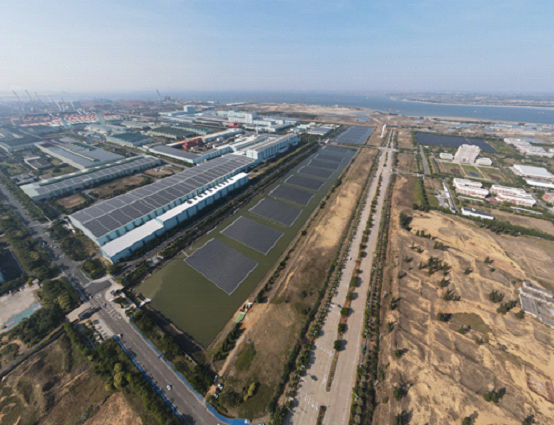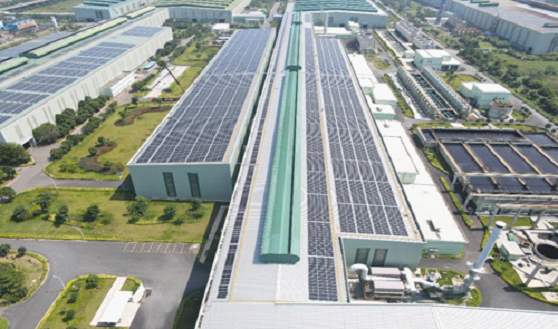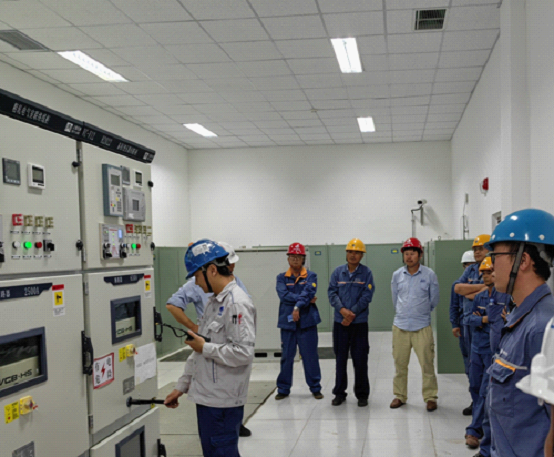Baosteel Zhanjiang Steel’s PV power generation on-grid
Date:2023/4/20 Source: CISDI
CISDI has put Step 1 of phase II of Baosteel Zhanjiang Steel’s photovoltaic power generation on-grid, with full capacity.
It is the first distributed PV power generation project in China’s steel industry which operates across water, land and air and is also the largest single generator in the ferrous metallurgical new energy sector.
Its installed capacity totals 46.89MW, transmitting around 50x106 kWh of green power a year to Zhanjiang Steel.
Achieving an annual 29,000 tonnes carbon reduction, the CISDI-built PV power generator plays an important role in boosting Zhanjiang Steel’s goal of becoming the world’s most efficient and competitive green carbon steel manufacturing base.
Pioneering total solutions for ferrous metallurgical green energy
A pioneer of new energy for the metallurgical sector, CISDI’s innovation-driven solutions enable the safe, highly-efficient and eco-friendly conversion and application of new energy.
Its expertise results in highly efficient power generation and reliable and safe power consumption.
Determined to reduce carbon emissions and readjust its energy structure, Baosteel Zhanjiang Steel turned to CISDI for the building of a Green Power Plant which had the capability to create energy from wind, PV and stored energy and create green power for hydrogen.
With an in-depth understanding of electric load characteristics for steel manufacturing, CISDI created total green energy solutions for the plant, and negated a number of the recognised issues of new energy supply - unstable output, weak support to the grid, low resistance to interference and large impact of metallurgical loads.
The PV power generating system has been built onto the roofs of large buildings at the East Plant, which are used as maintenance workshops for cold rolling, hot rolling and continuous casting.
A PV system has also been built on the surface of the Dongshan Lake.
Working at these locations meant many major challenges had to be overcome. The risk of typhoons and the issue of metal corrosion meant the locations required a higher standard of electricity consumption safety and electric energy quality.
Saving space and maximising PV power-generating efficiency
With space at a premium, and to ensure construction was carried out safely and reliably, CISDI’s engineering specialists analysed and verified each production process during the fitting of PV panels to the workshop roofs.
They negated risks posed by high heat conditions and corrosive and explosive areas; and conducted a refined simulation and arrangement of water and terrestrial regional arrays.
As a result, the maximum number of PV panels has been installed and these areas are enjoying a consistent radiation intensity on their matrix divided.
The entire PV power generating efficiency has been systematically enhanced.
Bedrock structures will withstand coastal corrosion and the worst of typhoons
All PV power-generating facilities have been built to cope with the harshest of environmental hazards the coastal site is exposed to.
Although they are rarely seen in the area, structures are designed to withstand the destructive power of intensity-level 18 super-typhoons.
To facilitate installation and also to give extra strength, all fittings on roof, ground and water surfaces are designed with floating component simulation and stress support distribution.
High-strength equipment, and use of materials with a high property of corrosion resistance, were selected.
Grid connection features safer power consumption and higher electric energy quality
To ensure the power system runs safely and does not interfere with production, during the engineering phase CISDI’s team carried out an in-depth survey of the plant’s power supply and distribution system.
The process and load characteristics of each individual production plant were taken into account and their switch-in options were compared by collecting all existing electric room design and operational data. This led to an optimal definition of the points for switch-in.
A comprehensive simulation and analysis of power flows across the plant’s power supply and distribution system was implemented and a rigorous grid connection solution was created. It encompasses relay protection, disconnection troubleshooting and emergency power supply measures.

An aerial view of the PV power-generating facilities at Baosteel Zhanjiang, which were built by CISDI to an EPC mode

Rooftop PV-installations at Zhanjiang Steel’s 1,780mm hot rolling building

A CISDI engineer provides technical assistance at the PV power generating site

